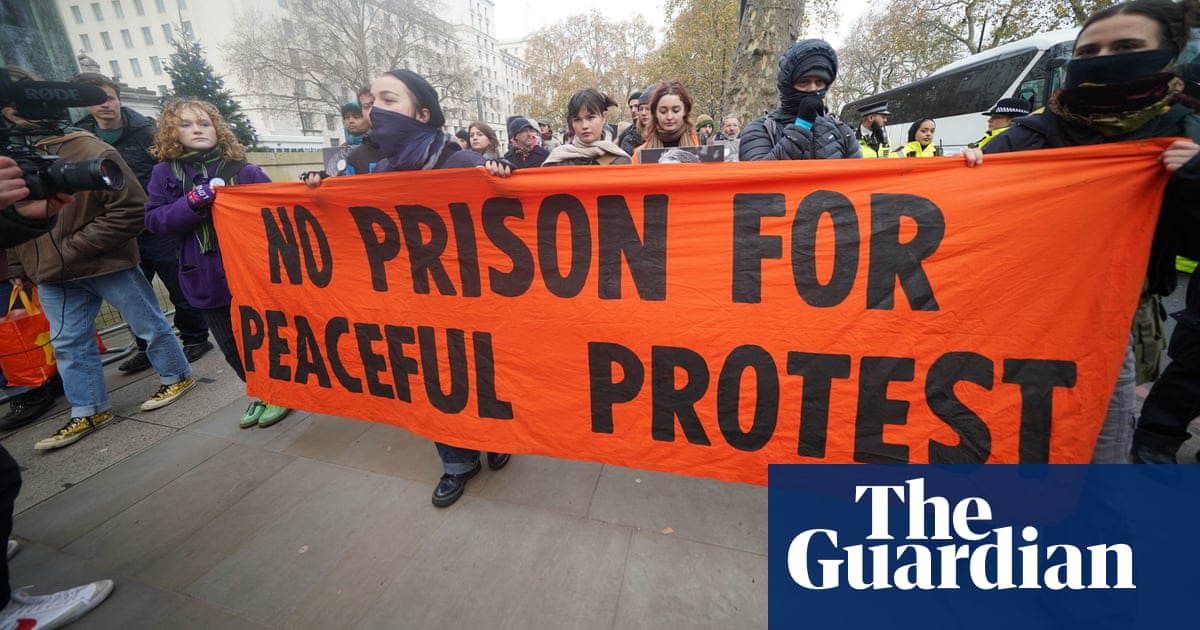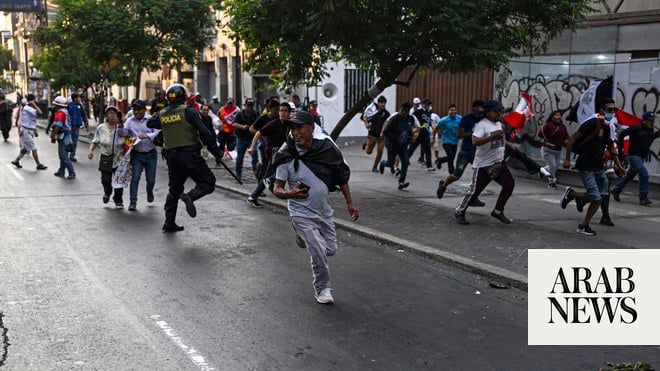
Police have made at least 630 arrests of peaceful protesters campaigning against new oil and gas production in the past month, as the authorities exploit new powers under the government’s anti-protest legislation.
The mass arrests of more than 470 people – some individuals were arrested more than once – was condemned by civil rights group Liberty as “staggering and shocking”.
The protests involve slow marching along roads and are a form of peaceful civil resistance analogous to the “freedom” rides in the US in 1961, when individuals protested against segregated public transport, says Just Stop Oil.
Evidence gathered by the Guardian over the last four weeks reveals some people have been held in police custody for long periods after arrest.
A 23-year-old was arrested within five minutes of joining a demonstration on 13 November, and held for 56 hours in custody before being presented to court, according to his testimony to the Guardian.
A 19-year-old student was held for three nights in a London prison despite being given bail by a magistrates court. The student is considering a case of false imprisonment.
The protests over the past four weeks coincided with the British government confirming in the king’s speech its plans to grant new North Sea oil and gas licences every year.
Police are using new powers to make the mass arrests under section 7 of the Conservative government’s Public Order Act 2023, which bans any action that “interferes with the use or operation of any key national infrastructure”.
According to data gathered by Just Stop Oil and not disputed by the Metropolitan police, almost half of the arrests were carried out under section 7. The offence carries a prison sentence of up to 12 months.
The 19-year-old student, who cannot be named for legal reasons, was held in a London prison for four nights after his arrest under section 7. After the first night in prison, he appeared by video link for a court appearance. He was bailed by the court, and should have been released. The student was held for a further three nights in a prison cell, according to testimony given to the Guardian.
“I consider that I was illegally imprisoned over the three nights of that weekend and will be taking a case of wrongful imprisonment,” the student said.
Another 19-year-old student who was arrested and also cannot be named for legal reasons, was held for 50 hours in a London police cell, from a Monday morning to Wednesday at 1pm.
She was charged under section 7 of the act after 24 hours in custody, but held for another day-and-a-half in custody before being taken to court.
“I remember asking for my medication, and I didn’t get it,” she said. “I asked multiple times. One of the officers said: ‘Why didn’t you have it with you?’ I said: ‘I didn’t expect to be held for 50 hours in a cell.’ And the officer said: ‘What, after what you have done?’
“Like I was a murderer or something, they just wanted me to feel bad.”
Jun Pang, a policy and campaigns officer for Liberty, said: “We all have the right to make our voices heard on the issues that matter to us. The staggering number of people arrested in recent weeks, many under this new legislation, shows just how sweeping and dangerous these powers are. It’s shocking to see hundreds of young protesters criminalised simply for standing up for what they believe in.”
Scotland Yard said 630 arrests had been made of Just Stop Oil protesters since 30 October, and 328 people went on to be charged. The rest have been released on police bail.
JSO data shows at least 276 people have been charged: at least 125 were charged with blocking key national infrastructure under section 7 and 125 with the lesser offence of wilful obstruction of the highway.
Just Stop Oil said: “They’re imprisoning peaceful protesters, protecting the real criminals, and licensing more than 100 new oil and gas projects while everything burns.”
The widespread use of section 7 appears to have taken its toll on Just Stop Oil’s latest campaign of protest. On Wednesday, just half a dozen people turned up at Trafalgar Square, with only three wearing orange bibs with the group’s insignia. A couple of police officers hovered nearby.
Asked why they thought so few had come, one demonstrator said: “Everyone’s been arrested, everyone’s got court.”
Rachel Payne, 73, said she had already been jailed for her part in Just Stop Oil’s campaign during last year’s Cop27 climate talks.
She said the law had narrowed down what they were able to do as protest. “Last week, I saw them [protesters] get to the top of Whitehall and as soon as they put their feet on the road swarms of police just arrested them – two days running.
“In this country it’s supposed to be a free country. [Facilitating] protest is supposed to be a duty of the police – to enable protest – and yet they [the protesters] were not even allowed to be there.”
A university lecturer who knows one of those arrested said he believed the use of section 7 for walking down a road was disproportionate for such a peaceful protest.
Graham Mann, a lecturer in atmospheric science at Leeds University, said: “My perspective from being a PhD student in the 90s and the urgency of the climate emergency then, the science is very, very clear and has been for a long time. The urgency to decarbonise to reduce emissions has become even greater. So I can understand young people taking these actions.”
A spokesperson for Climate Action Support Pathway, which provides advice to those considering taking action, said: “This was the first real test for these new section 7 powers, and it became quickly clear that the police were going to use them readily. We changed the emphasis of our advice to those considering taking part as a result because section 7 carries a higher maximum penalty of a year in prison, and people need to be making informed choices about whether they want to take action or not.”
Asked about the 19-year-old student held in a London prison, a Ministry of Justice spokesperson said: “We are looking into this matter.”
Scotland Yard said: “All of the decisions on whether to charge, bail or NFA [no further action] Just Stop Oil activists have all been made within the 24 hours. We are working with magistrates courts across London, and in some cases in other counties, to put the activists who have been charged before magistrates at the earliest opportunity. However, there is only a limited number of people who can be seen by magistrates each day so it is not always possible for them to appear on the day they are charged.”












